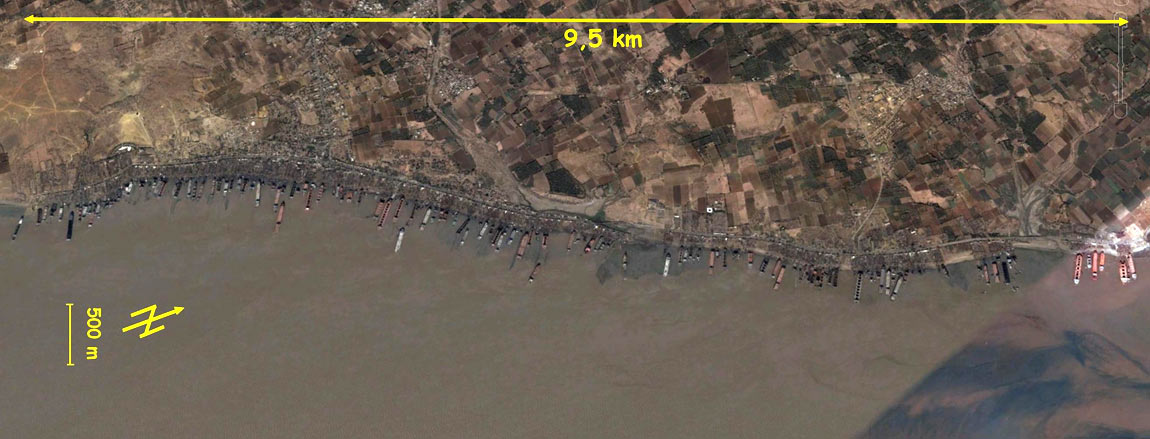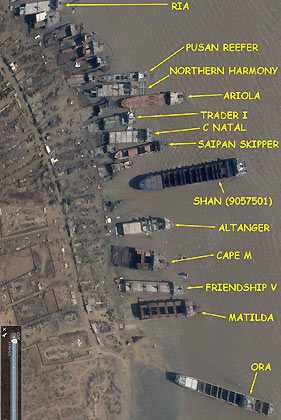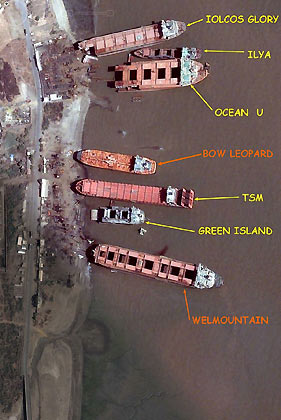One of more interesting was keeping tabs on the number and type of ships meeting their end in the Indian town of Alang, final resting place for half the world's ships. Looking at the proportion of container ships to dry bulk carriers to tankers gives a little insight into the macro economy and a little more into the shipping business.
Here's Alang on February 7, 2013 from Google Earth via Marine Marchande:



Now, instead of paying a local (foreigners not allowed on the beach) to identify the new arrivals there is the Ship Scrapping blog:
Ship demolition report 12/7/2013
Gadani
Naviga [LR] IMO 9150365 Crude oil tanker built 1998 - 150,841 dwt
China
Fu Kuo Hsin [PA] IMO 7327718 Cargo vessel built 1973 - 22,186 dwt
Other
Seaboard Star [PA] 7812830 Roro vessel built 1979 - 12,161 dwt
Maridive Explorer [EG] IMO 7716854 Research vessel built 1977 - 650 dwt
Venus [?] IMO 7111078 Passenger vessel built 1971 - 16,710 dwt
Petrolimex 04 [VN] IMO 8716148 Oil tanker built 1988 - 29,998 dwt
Honour [CY] IMO 8718122 Cintainer vessel built 1989 - 49,262 dwt
Ship demolition report 11/7/2013
AliagaAlang
Murmansk [MT] IMO 8118140 Bulk carrier built 1984 (UK) 30,650 dwt
Veracruz Express [BM] IMO 8406298 Container vessel built 1986 - 40,870 dwt
Shoureng [PA] IMO 9003615 Bulk carrier built 1992 - 231,931 dwt
Zenith 4 [CK] IMO 8807703 - Cargo vessel built 1990 - 40,187 dwt
Maria V [MH] IMO 8315281 Bulk carrier built 1987 - 69,229 dwt
Habib [TZ[ IMO 7631236 Passenger roro built 1978 - 3,372 dwt
Rainforest [PA] IMO 8521804 reefer built 1985 - 13,536 dwt
Anji [DE] IMO 9110561 Container vessel built 1995 - 45,470 dwt
Soy 10 [KN] IMO 7430711 Roro vessel built 1979 - 14,484 ex Finneagle
Elizabeth [KN] IMO 9064774 Bulk carrier built 1993 - 20,140 dwt
China
Hoegh Trapeze [NO] IMO 8130966 Vehicle carrier built 1983 - 15,500 dwt
Star Americal [NO] IMO 8508280 Cargo vessel built 1985 - 30,168
Birlik 1 [PA] IMO 7325241 Passenger roro built 1973 - 5,500 dwt...MORE
As can be seen there are two tankers being scrapped in the July 12 report, something you did not have during the oil price spike in 2008 and something that we may see more of as the U.S. begins to rely more on its own oil resources and China slows down.
And why do I use the past tense? Two reasons: The Baltic Dry is at 1151 and, with the advent of online sources, I'm not sure if there is an information advantage any more:
